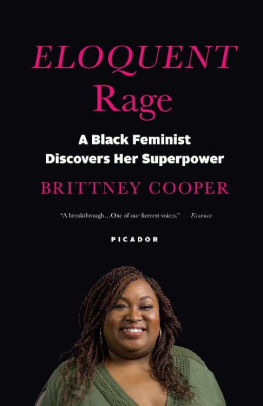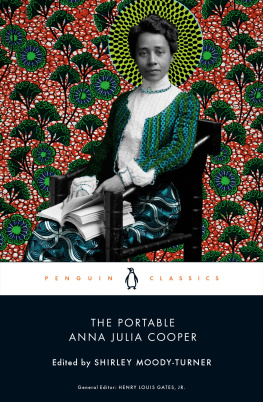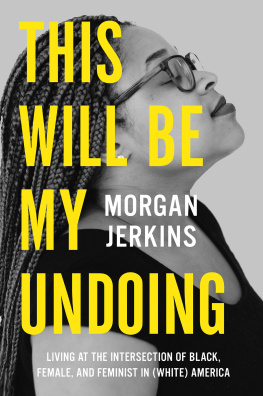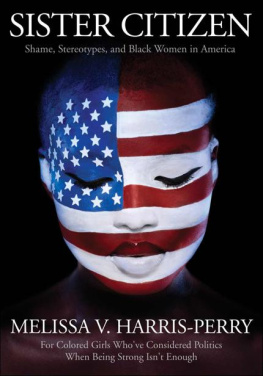
Thank you for buying this
St. Martins Press ebook.
To receive special offers, bonus content,
and info on new releases and other great reads,
sign up for our newsletters.

Or visit us online at
us.macmillan.com/newslettersignup
For email updates on the author, click here.
The author and publisher have provided this e-book to you for your personal use only. You may not make this e-book publicly available in any way. Copyright infringement is against the law. If you believe the copy of this e-book you are reading infringes on the authors copyright, please notify the publisher at: us.macmillanusa.com/piracy.
FOR GRANDMAMA AND HER DAUGHTERS
This is a book by a grown-ass woman written for other grown-ass women. This is a book for women who expect to be taken seriously and for men who take grown women seriously. This is a book for women who know shit is fucked up. These women want to change things but dont know where to begin.
To be clear, Im not really into self-help books, so I dont have one of those catchy three-step plans for changing the world. What I have is anger. Rage, actually. And thats the place where more women should beginwith the things that make us angry.
When it comes to Black women, sometimes Americans dont recognize that sass is simply a more palatable form of rage. Americans adore sassy Black women. You know, those caricatures of finger-waving, eye-rolling Black women at whom everyone loves to laughwomen like Tyler Perrys Madea, Mammy in Gone with the Wind , or Nell from that old eighties sitcom Gimme a Break! These kinds of Black women put white folks at ease.
In my first terrible job after college, my boss, an older white woman, told me that the students at the predominantly Black school at which we worked had deemed her an honorary Black woman. When I looked at her with question marks in my eyes, she said, You know, they mean the way I talk to them and roll my neck, and demonstrated it for me. I went on back to my desk.
Years after that, I was doing a summer abroad in South Korea. My Malaysian roommate, who had seen many episodes of the old nineties sitcom Family Matters , told me that she loved Black women because we were sassy like Harriette and Laura Winslow, the main Black female characters on that show. To her, these stereotypical portrayals made Black folks seem understandable, even though to me, her descriptions felt like we were exotic others. She loved it, she said, when Black women put their hands on their hips and swiveled their necks in protest. Not wanting to offend this woman who I otherwise really liked, I simply said, Were not all like that. She looked disappointed.
I am fat, Black, and Southern. But this is not a sassy Black girls tale. Black women turn to sass when rage is too riskybecause we have jobs to keep, families to feed, and bills to pay. Black women who hold their communities together also hold our broader American community together. But its unclear whether we are really being taken seriously.
Owning anger is a dangerous thing if youre a fat Black girl like me. Angry Black Women get dismissed all the time. We are told we are irrational, crazy, out of touch, entitled, disruptive, and not team players. The story goes that Angry Black Women scare babies, old people, and grown men. This is absurd. And it is a lie. If you have the nerve to be fat and angry, then you are treated as a bully even if you are doing nothing aggressive at all. The truth is that Angry Black Women are looked upon as entities to be contained, as inconvenient citizens who keep on talking about their rights while refusing to do their duty and smile at everyone. Dont you just hate when folks yell at you to Smile!? I told the last man who said that shit to me, You smile!
Some years ago, I ran into a former student on the college campus where I was teaching. Erica was a brilliant Black girl who wrote great papers and asked really smart questions. As we were standing around with a group of others, chatting, she said, I loved having you as my professor. Your lectures were filled with rage. But it was, like, the most eloquent rage ever. I immediately felt defensive. What did she mean by rage ? Im not angry, I told her. Im passionate. By then, I was wary of the Angry Black Woman stereotype. Even though I was only in my mid-twenties at the time, I had already experienced many years of white people doing that thing they do to articulate Black womenalways asking us Why are you so angry? I hated the accusation from others, usually white people, because it was unfair, a way to discredit the legitimacy of the things Black women say by calling them emotional and irrational. But Erica was a Black girl. She fixed me with a telltale look that only another Black woman can give you, a look that said, Girl, be for real. And then she said, Brittney, you know youre angry. I felt exposed. I couldnt even say anything. She had seen through the veneer, seen the lie I was telling. It was devastating. And life-changing.
I was angry. As hell. And I was fooling no one.
Black women have the right to be mad as hell. We have been dreaming of freedom and carving out spaces for liberation since we arrived on these shores. There is no other group, save Indigenous women, that knows and understands more fully the soul of the American body politic than Black women, whose reproductive and social labor have made the world what it is. This is not mere propaganda. Black women know what it means to love ourselves in a world that hates us. We know what it means to do a whole lot with very little, to make a dollar out of fifteen cents, as it were. We know what it means to snatch dignity from the jaws of power and come out standing. We know what it means to face horrific violence and trauma from both our communities and our nation-state and carry on anyway. But we also scream, and cry, and hurt, and mourn, and struggle. We get heartbroken, our feelings get stepped on, our dreams get crushed. We get angry, and we express that anger. We know what it means to feel invisible.
* * *
I know what it means to feel invisible. To be picked on, bullied, misunderstood, and dismissed. But when Erica called me out on my anger, it was clear that she saw me in a way that I wasnt particularly interested in being seen. She helped me to realize that my anger could be a powerful force for good. She had called my rage eloquent . Clear. Expressive. To the point. In her estimation, it had made me a good teacher, and it had inspired her and other students.
Over and over again, Black girls have called me out and demanded that I get my shit together, around my rage, around my work in the world, and around my feminism. Those Black girl callouts, or homegirl interventions, as I call them in this book, have come from my grandmama, my mama, and my girls. And they have saved my life.
America needs a homegirl intervention in the worst way. So in this book, I am doing what Black women do best. Im calling America out on her bullshit about racism, sexism, classism, homophobia, and a bunch of other stuff.
And Im using feminism to stage this homegirl intervention. Im here for picket signs, pussy hats (as long as there are plenty of brown ones in the mix), and patchouli. My picket signs are as likely to say FUCK THE POLICE as they are to say FUCK THE PATRIARCHY . Black-girl feminism is all the rage, and we need all the rage. Feminism can give us a common language for thinking about how sexism, and racism, and classism work together to fuck shit up for everybody.
Like many other feminists, I used to carry around Audre Lordes book Sister Outsider like it was the feminist bible. Her essay The Uses of Anger: Women Responding to Racism taught me that rage is a legitimate political emotion. She writes, Focused with precision, it can become a powerful source of energy serving progress and change.
Next page






